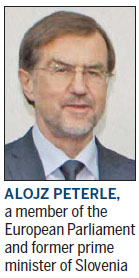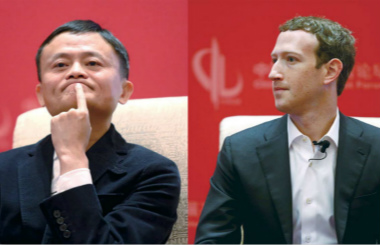Xi's Czech visit sign of better relations
Updated: 2016-04-08 08:20
By Su Qiang and Chen Yingqun(China Daily Europe)
|
|||||||||
President Xi Jinping's state visit to the Czech Republic, his first to Central and continental Europe, sent a positive sign of strengthened relations between the EU and China, according to a top official.
Alojz Peterle, a member of the European Parliament and former prime minister of Slovenia, says he was happy to see the two countries agree to elevate relations to a strategic partnership during Xi's three-day visit in March.
Even before the World War II, the Czechs were known for their industrial power, so it will be easy for Chinese companies to find partners in industry, the service sector and the cultural sector, he says.
Xi's visit was also a sign of a stronger ambition to develop EU-China relations, he says.
"In this world, which is changing so quickly, we need stronger partnership," Peterle says, adding that the European Union is now working on preparations for investment agreements with China as well as with the United States, Canada and Japan.

Although China's GDP growth target has been adjusted to about 6.5 percent, countries in Europe would be pleased with 6 percent, he says.
"It's important that China is growing, but the quality of growth is also important," he says, adding that as China encounters slower growth, it will become more attentive to quality and sustainability.
China's investment in Europe has also grown quickly in recent years, an exchange that is important, he says. "We're getting more interdependent, we do more things together, we understand each other better. We definitely like the fact Chinese capital is entering the EU."
Peterle, who has survived a battle with cancer, is also a member of the European Parliament's committee for the environment, public health and food safety. He believes 40 percent of cancer cases can be prevented with proper lifestyles and diets and a positive attitude.
He suggests Chinese not develop too many Western habits. "Traditional knowledge is a very strong and important component in China. Today, we should combine the best from the past and modern times. Each person can do a lot for his or her health."
Today, almost every European country is facing problems with its health system, and there's a lack of funding, which is why government support and education are so important, he says.
"It's not enough to have good doctors and equipment in hospitals; the important thing is that people are aware of how to protect their health."
(China Daily European Weekly 04/08/2016 page15)
Today's Top News
Zhubi Reef lighthouse comes to life
Huawei picks UK for global launch of new phone
Social media fury after woman claims attack in hotel
Germany rules out debt relief for Greece
Li: Tax reform to boost vitality of real economy
First wave of migrants returned to Turkey
Once-endangered pony makes comeback
Bookshop worms way into community
Hot Topics
Lunar probe , China growth forecasts, Emission rules get tougher, China seen through 'colored lens', International board,
Editor's Picks

|

|

|

|

|

|







